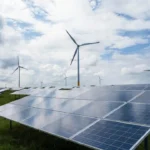In the face of escalating energy demands and environmental concerns, energy efficiency has emerged as a cornerstone for achieving sustainability goals. This article delves into the historical evolution of energy efficiency, its significance in the modern era, strategies for implementation, and the transformative impact it can have on global energy consumption.
The Evolution of Energy Efficiency
The pursuit of energy efficiency has deep historical roots, with early efforts focused on optimizing mechanical processes and harnessing energy more effectively. However, the modern understanding gained prominence during the energy crises of the 20th century.
Energy Crises – Catalysts for Change
The oil crisis of the 1970s spurred a reevaluation of energy consumption patterns, leading to a heightened awareness of the need for efficiency measures. Governments, industries, and individuals began exploring ways to reduce energy waste and improve overall efficiency to ensure long-term energy security.
Technological Advances – Driving Efficiency Innovations
Technological advancements, including the development of energy-efficient appliances, industrial processes, and building design, were pivotal in shaping the landscape. Innovations such as LED lighting, smart thermostats, and high-efficiency motors have become symbols of progress in sustainability.
The Significance of Energy Efficiency
Energy efficiency is critical for addressing multiple challenges, including resource depletion, environmental degradation, and climate change. The significance of it is underscored by its potential to decrease energy consumption, lower greenhouse gas emissions, and enhance overall economic and environmental sustainability.
Environmental Impact – Mitigating Climate Change
One of the primary benefits of energy efficiency is its contribution to mitigating climate change. By decreasing energy consumption and emissions, measures play a vital role in curbing the environmental impact of human activities, contributing to global efforts to limit temperature increases.
Economic Advantages – Fostering Sustainable Growth
It is closely tied to economic prosperity. Businesses that adopt energy-efficient practices often experience reduced operational costs, increased competitiveness, and enhanced resilience to energy price fluctuations. It contributes to sustainable economic growth by optimizing resource use.
Resource Conservation – Preserving Natural Capital
Efficient use of energy resources translates to reduced demand for fossil fuels and other finite resources. This conservation helps preserve natural landscapes, mitigate environmental degradation associated with resource extraction, and safeguard ecosystems, contributing to long-term environmental sustainability.
Strategies for Implementing Energy Efficiency
The journey toward energy efficiency involves adopting a multifaceted approach encompassing technological, organizational, and behavioral changes. Various strategies can be employed to enhance energy efficiency across sectors.
Energy Audits – Identifying Opportunities
Conducting energy audits is a fundamental step in understanding current energy usage patterns and identifying areas for improvement. These audits, whether for industrial facilities, commercial buildings, or residential homes, provide valuable insights into energy inefficiencies and potential optimization opportunities.
Energy-Efficient Technologies – Transforming Industries
Deploying energy-efficient technologies is a key strategy for enhancing efficiency across industries. Adopting innovations that minimize energy waste, from advanced manufacturing processes to smart grid technologies, improves overall efficiency and sustainability.
Building Design and Retrofitting – Creating Efficient Spaces
Designing energy-efficient buildings and retrofitting existing structures with energy-saving features are effective strategies in the construction sector. These may include insulation, energy-efficient windows, and smart building management systems that optimize lighting, heating, and cooling.
Behavioral Changes – Fostering a Culture of Efficiency
Encouraging behavioral changes is essential for realizing the full potential of energy efficiency. It involves raising awareness, promoting energy conservation practices, and instilling a culture of responsibility and mindfulness regarding energy consumption in individuals and organizations.
Transformative Impact on Global Energy Consumption
The widespread adoption of energy efficiency measures can reshape the global energy landscape. From reducing reliance on fossil fuels to optimizing energy use in various sectors, the transformative impact of It extends across the entire energy spectrum.
Renewable Energy Integration – Enhancing Sustainability
Energy efficiency complements the integration of renewable energy sources, creating a more sustainable and resilient energy mix. Maximizing energy efficiency, the transition to renewables becomes more economically viable and environmentally impactful.
Energy Security – Mitigating Supply Risks
Improving energy efficiency helps mitigate supply risks by reducing the dependence on finite resources and volatile energy markets. Diversifying energy sources and optimizing consumption enhance energy security on regional and global scales.
Smart Cities and Communities – Pioneering Sustainable Living
The concept of smart cities leverages energy efficiency technologies and data-driven solutions to create sustainable urban environments. From intelligent transportation systems to energy-efficient infrastructure, smart cities exemplify efficient and sustainable living.
Future Perspectives and Global Collaboration
As the world grapples with the challenges of a growing population and increasing energy demands, the importance of energy efficiency is set to intensify. Future perspectives involve continued innovation, policy support, and collaborative efforts to mainstream energy-efficient practices globally.
Technological Innovations – Shaping the Energy Landscape
Ongoing technological innovations, such as artificial intelligence, the Internet of Things (IoT), and advanced materials, hold the key to unlocking new frontiers in energy efficiency. These innovations will be crucial in creating more intelligent and adaptive energy systems.
Policy Initiatives – Driving Systemic Change
Government policies and international collaborations drive systemic change toward energy efficiency. Establishing and enforcing energy efficiency standards, offering incentives, and fostering a supportive regulatory environment are critical for promoting widespread adoption.
Global Collaboration – Addressing Shared Challenges
Global collaboration is essential for addressing shared challenges related to energy efficiency. Knowledge sharing, joint research initiatives, and international agreements contribute to a collective effort to optimize energy use, mitigate climate change, and achieve sustainable development goals.
Conclusion
Energy efficiency is a powerful catalyst for addressing the interconnected challenges of climate change, resource depletion, and economic sustainability. From historical efforts to modern innovations, the journey toward energy efficiency reflects a commitment to optimizing resource use and fostering a more sustainable future. As individuals, businesses, and governments adopt energy-efficient practices, the collective impact can transform the global energy landscape, fostering a more resilient, equitable, and environmentally conscious world.





